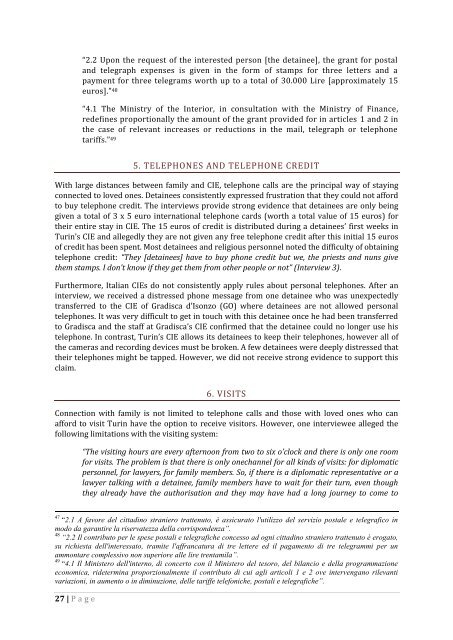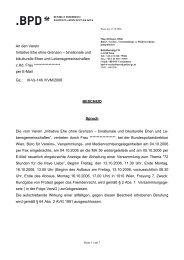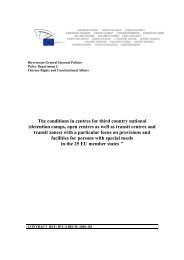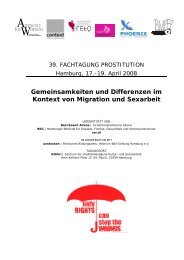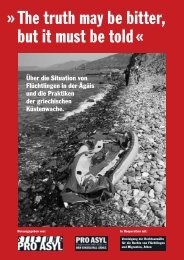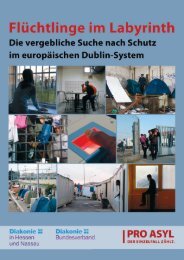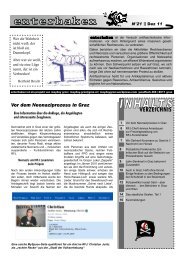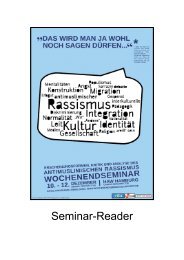Turin's CIE - International University College of Turin
Turin's CIE - International University College of Turin
Turin's CIE - International University College of Turin
You also want an ePaper? Increase the reach of your titles
YUMPU automatically turns print PDFs into web optimized ePapers that Google loves.
“2.2 Upon the request <strong>of</strong> the interested person [the detainee], the grant for postal<br />
and telegraph expenses is given in the form <strong>of</strong> stamps for three letters and a<br />
payment for three telegrams worth up to a total <strong>of</strong> 30.000 Lire [approximately 15<br />
euros].” 48<br />
“4.1 The Ministry <strong>of</strong> the Interior, in consultation with the Ministry <strong>of</strong> Finance,<br />
redefines proportionally the amount <strong>of</strong> the grant provided for in articles 1 and 2 in<br />
the case <strong>of</strong> relevant increases or reductions in the mail, telegraph or telephone<br />
tariffs.” 49<br />
5. TELEPHONES AND TELEPHONE CREDIT<br />
With large distances between family and <strong>CIE</strong>, telephone calls are the principal way <strong>of</strong> staying<br />
connected to loved ones. Detainees consistently expressed frustration that they could not afford<br />
to buy telephone credit. The interviews provide strong evidence that detainees are only being<br />
given a total <strong>of</strong> 3 x 5 euro international telephone cards (worth a total value <strong>of</strong> 15 euros) for<br />
their entire stay in <strong>CIE</strong>. The 15 euros <strong>of</strong> credit is distributed during a detainees’ first weeks in<br />
<strong>Turin</strong>’s <strong>CIE</strong> and allegedly they are not given any free telephone credit after this initial 15 euros<br />
<strong>of</strong> credit has been spent. Most detainees and religious personnel noted the difficulty <strong>of</strong> obtaining<br />
telephone credit: “They [detainees] have to buy phone credit but we, the priests and nuns give<br />
them stamps. I don’t know if they get them from other people or not” (Interview 3).<br />
Furthermore, Italian <strong>CIE</strong>s do not consistently apply rules about personal telephones. After an<br />
interview, we received a distressed phone message from one detainee who was unexpectedly<br />
transferred to the <strong>CIE</strong> <strong>of</strong> Gradisca d’Isonzo (GO) where detainees are not allowed personal<br />
telephones. It was very difficult to get in touch with this detainee once he had been transferred<br />
to Gradisca and the staff at Gradisca’s <strong>CIE</strong> confirmed that the detainee could no longer use his<br />
telephone. In contrast, <strong>Turin</strong>’s <strong>CIE</strong> allows its detainees to keep their telephones, however all <strong>of</strong><br />
the cameras and recording devices must be broken. A few detainees were deeply distressed that<br />
their telephones might be tapped. However, we did not receive strong evidence to support this<br />
claim.<br />
6. VISITS<br />
Connection with family is not limited to telephone calls and those with loved ones who can<br />
afford to visit <strong>Turin</strong> have the option to receive visitors. However, one interviewee alleged the<br />
following limitations with the visiting system:<br />
“The visiting hours are every afternoon from two to six o’clock and there is only one room<br />
for visits. The problem is that there is only onechannel for all kinds <strong>of</strong> visits: for diplomatic<br />
personnel, for lawyers, for family members. So, if there is a diplomatic representative or a<br />
lawyer talking with a detainee, family members have to wait for their turn, even though<br />
they already have the authorisation and they may have had a long journey to come to<br />
47 “2.1 A favore del cittadino straniero trattenuto, è assicurato l'utilizzo del servizio postale e telegrafico in<br />
modo da garantire la riservatezza della corrispondenza”.<br />
48 “2.2 Il contributo per le spese postali e telegrafiche concesso ad ogni cittadino straniero trattenuto è erogato,<br />
su richiesta dell'interessato, tramite l'affrancatura di tre lettere ed il pagamento di tre telegrammi per un<br />
ammontare complessivo non superiore alle lire trentamila”.<br />
49 “4.1 Il Ministero dell'interno, di concerto con il Ministero del tesoro, del bilancio e della programmazione<br />
economica, ridetermina proporzionalmente il contributo di cui agli articoli 1 e 2 ove intervengano rilevanti<br />
variazioni, in aumento o in diminuzione, delle tariffe telefoniche, postali e telegrafiche”.<br />
27 | P a g e


